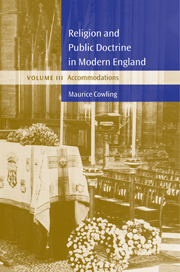Book contents
- Frontmatter
- Contents
- Foreword and acknowledgements
- Introduction
- I The Christian intellect and modern thought in modern England
- 1 The reanimation of Protestantism I
- 2 Christianity and literature I
- 3 The reanimation of Protestantism II
- 4 The enlargement of Christianity
- 5 Christianity and literature II
- 6 Christianity and modern knowledge I
- 7 Whiggism, Liberalism and Christianity I
- 8 Whiggism, Liberalism and Christianity II
- 9 Christianity and modern knowledge II
- 10 Christianity in an unfriendly world I
- 11 Christianity in an unfriendly world II
- 12 Christianity in an unfriendly world III
- 13 Christianity in an unfriendly world IV
- 14 Christianity in an unfriendly world V
- II The post-Christian consensus
- III Conclusion: religion and public doctrine in modern England
- Notes
- Index of proper names
11 - Christianity in an unfriendly world II
Published online by Cambridge University Press: 23 December 2009
- Frontmatter
- Contents
- Foreword and acknowledgements
- Introduction
- I The Christian intellect and modern thought in modern England
- 1 The reanimation of Protestantism I
- 2 Christianity and literature I
- 3 The reanimation of Protestantism II
- 4 The enlargement of Christianity
- 5 Christianity and literature II
- 6 Christianity and modern knowledge I
- 7 Whiggism, Liberalism and Christianity I
- 8 Whiggism, Liberalism and Christianity II
- 9 Christianity and modern knowledge II
- 10 Christianity in an unfriendly world I
- 11 Christianity in an unfriendly world II
- 12 Christianity in an unfriendly world III
- 13 Christianity in an unfriendly world IV
- 14 Christianity in an unfriendly world V
- II The post-Christian consensus
- III Conclusion: religion and public doctrine in modern England
- Notes
- Index of proper names
Summary
The very word Gospel may become a piece of pious slang.We do not betray enough of the manner of people who are habitually under authority to it, who are held by it, crushed and born again by it, people who are broken to pieces and made again from the dust, people who are shut for ever from the old Eden … So much of our religious teaching betrays no sign that the speaker has descended into hell, been near the everlasting burnings, or been plucked from the awful pit. He has risen with Christ – what right have we to deny it? – but it is out of a shallow grave, with no deepness of earth, with no huge millstone to roll away.
(Rev. P. T. Forsyth, The Church, The Gospel and Society, 1905, 1962 edn, p. 100)My own view is that the Churches should frankly recognise that the majority of the British people are not Christians and therefore cannot be expected to lead Christian lives.
(C. S. Lewis, Christian Behaviour, 1943, reprinted in Mere Christianity, 1952, p. 99)I do not think any policy ought to be forwarded by the Church as a corporate society, and imposed in its name in a State in which churchmanship has no longer anything to do with the qualifications of a citizen. Those who take their ethical ideas from Nietzsche or their practice from Gabriele d'Annunzio, are hardly likely to be in favour of Christian solutions; and they have every whit as much a place in the State as you.
(Rev. J. N. Figgis, Churches in the Modern State, 1913, pp. 127–8)- Type
- Chapter
- Information
- Religion and Public Doctrine in Modern England , pp. 292 - 318Publisher: Cambridge University PressPrint publication year: 2001



